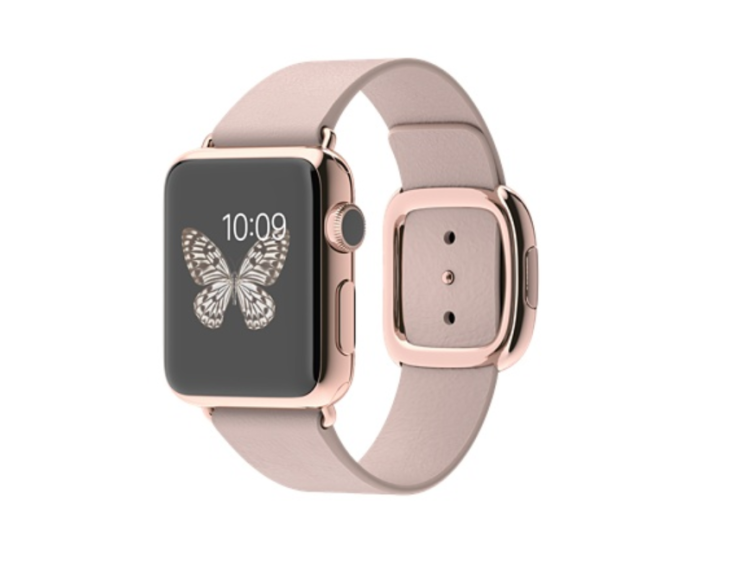Who Buys A $17,000 Apple Watch? Narcissists, For One

Last month, when CEO Tim Cook announced that Apple would begin selling a $17,000 smartwatch in early April, some people might have figured it was an early April fool’s prank.
A $17,000 smartwatch? With technology that will be obsolete in three years? Yeah, OK. It’s one thing to buy a Rolex or Patek Philippe -- but electronics obviously don’t hold value in the same way. Imagine presenting your grandson on his wedding day with a flip-phone from 2002. (No thanks.)
And yet, the 18-karat Apple timepiece is very much a real offering, with a bona-fide website with 360-degree views and a pre-order date of April 10. From Apple’s point of view, it’s a smart branding decision: Even though the company probably expects few people to purchase the $17,000 watch, it makes the $349 version seem like a steal.
But some (including this reporter) wondered: What kind of rich creep would actually buy the $17,000 version, knowing full well that it’s a ridiculous purchase?
We should be thanking Apple for launching the $10,000 "apple watch" as the new gold standard in douchebag detection.
— Anna Kendrick (@AnnaKendrick47) March 9, 2015Conceited Customers
Plenty of consumer psychologists have tried to answer this question as well. If you’ve ever worked in a retail luxury setting, their findings probably won’t surprise you. They say that those who are most likely to purchase the $17,000 Apple Watch will share a common trait--narcissism. Or, as one psychologist put it -- people looking for “plenty of ego gratification.”
“If you think about the narcissistic trait, it’s associated with the idea that you have a self-serving bias -- that you're unique,” says Russell Seidle, a strategy and international business professor at Sulfolk University in Boston. “So it makes sense that you would purchase products would be tailored to reflect that self-perception.”
Interestingly, in 2012, pre-Apple Watch, Seidle and a colleague performed a study looking at how narcissistic people tend to buy wristwatches. The experiment, titled “Narcissists as consumers: The effects of perceived scarcity on processing of product information,” showed how narcissists tend to purchase products that are relatively scarce -- even if they aren’t actually “better” than anything else on the market.
The experiment assembled 100 undergraduates in a room, ranked them according to their personal levels of narcissism, gave them fake cash, and showed them advertisements for a luxury watch. The results showed that narcissistic individuals had a “stronger desire for scarce products” when compared to their non-narcissistic counterparts.
“Ultimately, it’s more symbolic on the part of narcissists,” says Seidle. “You can demonstrate your uniqueness through your purchases.”
Ego and Envy
Kit Yarrow, a consumer psychologist and a professor at Golden Gate University in San Francisco, disputes that luxury goods purchasers are necessarily “narcissistic,” but posits that ego plays a big role in their purchase decisions.
“I think those people are looking for ego gratification,” Yarrow says. “In other words, they want to feel better about themselves. Also, clearly, they’re looking for admiration from other people as well. They think other people notice, and it’ll say something about them.”
But will it? Will the average person be impressed by anyone buying the $17,000 watch? Not exactly. In fact, it’s usually the opposite. The irony of purchases like these is that people who do notice the uber-expensive watch will more often than not look down on the person who bought it.
Brent McFerran, an assistant professor of marketing at the Beedie School of Business, at Simon Fraser University in Canada, has studied the average Joe’s perceptions of customers of luxury brands.
“It’s a paradox,” McFerran says. “People are more likely to seek out luxury brands as an outcome of feeling accomplished. However, what do others thinks of it? They don’t think you purchased it because you were successful. They think you’re a person who is egotistical.” And yet, people still eagerly buy up extraordinarily expensive handbags clothing, cars, and watches every day. McFerran says that it’s about “making your customer feel special in other ways” besides the product itself.
So, for the $17,000 watch, Apple is rolling out the red carpet: There will be a special station for try-ons, special support with a video conferencing option, and a “dedicated contact center phone number” reserved for watch owners.
“We know that those feelings of ‘specialness’ make you feel stronger bonds to the company,” McFerran says. “So yeah, it’s a watch, but look at these other perks. They’re getting the same product, but it’s a different experience along the way, and one they're paying a lot more for it.”
© Copyright IBTimes 2024. All rights reserved.












